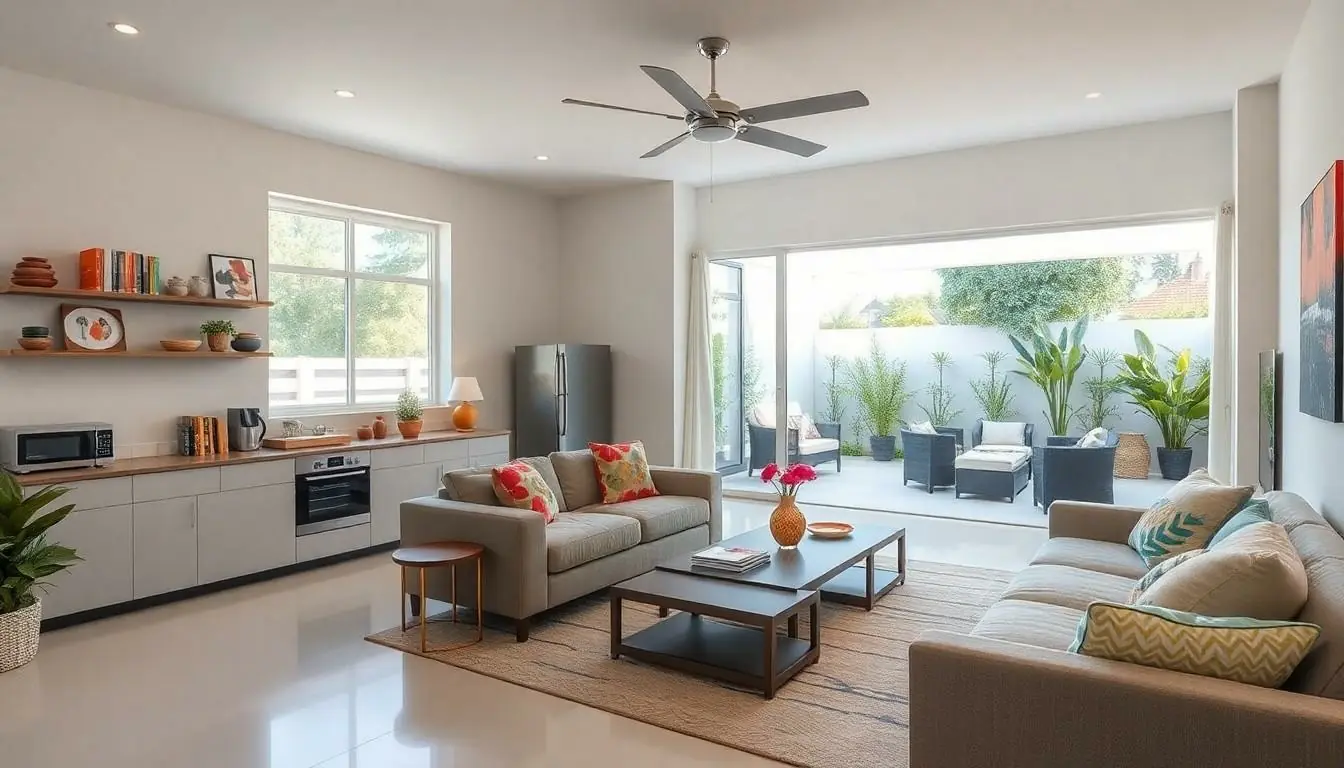Table of Contents
ToggleIn the ever-evolving world of short-term rentals, standing out is no small feat. Whether it’s a cozy cabin in the woods or a chic city apartment, the competition can feel like a wild game of musical chairs—except everyone’s a winner until the music stops. To keep that chair firmly beneath you, savvy hosts need a toolkit of tips to attract guests and ensure those five-star reviews roll in.
Understanding Short Term Rentals
Short-term rentals refer to lodging options available for a limited duration, often ranging from a single night to a few months. Popular platforms like Airbnb and VRBO allow property owners to rent out their spaces directly to travelers.
What Are Short Term Rentals?
Short-term rentals encompass private homes, apartments, or unique accommodations rented out on a temporary basis. These properties appeal to various travelers such as tourists, business professionals, and families seeking alternatives to traditional hotels. Regulations often govern them, with definitions and acceptable rental periods varying by location.
Benefits of Short Term Rentals
Short-term rentals offer several advantages for both hosts and guests. For hosts, increased income potential arises from renting out properties compared to long-term leasing. Guests enjoy a more personalized experience, with amenities like kitchens and separate living spaces, enhancing comfort. Additionally, short-term rentals foster local community engagement, allowing visitors to experience neighborhoods authentically. Many travelers prefer these accommodations for their flexibility and unique charm.
Preparing Your Property


Preparing a property for short-term rental involves multiple key steps. Hosts must ensure their space is appealing and meets necessary standards.
Essential Upgrades for Attractiveness
Upgrading furniture significantly enhances the comfort level of the rental. Choosing stylish decor can create an inviting atmosphere, making a positive first impression. Modern appliances improve functionality, which guests appreciate. Quality linens and towels contribute to a luxurious experience. Installing smart home features, like keyless entry or smart thermostats, adds convenience and appeal. Outdoor spaces, such as patios or gardens, can attract more guests.
Safety and Compliance Checks
Conducting safety checks is critical for any rental property. Checking smoke detectors and carbon monoxide alarms ensures guest safety. Inspecting for any potential hazards, like loose railings or exposed wires, prevents accidents. Compliance with local rental regulations protects hosts legally. Having liability insurance decreases financial risks associated with rentals. Lastly, providing emergency contact information enhances guest trust.
Marketing Your Short Term Rental
Effective marketing strategies enhance visibility and attract more guests to a short-term rental. Understanding where and how to promote the property is crucial.
Choosing the Right Platforms
Several platforms cater to short-term rentals. Airbnb and VRBO rank among the most popular, reaching extensive audiences. Hosts should also explore niche sites, such as HomeAway for vacation homes or Booking.com for urban stays. Each platform offers varying fees, features, and audience demographics. Choosing the right one depends on the target market and specific property type. Local listings or social media channels can supplement online presence, promoting unique features or special offers. Evaluating user reviews can help hosts select the most effective platform. Leveraging multiple platforms increases booking potential and maximizes visibility.
Crafting Compelling Listings
Compelling listings grab attention and entice potential guests. Start with high-quality photos showcasing the property’s best aspects, including inviting spaces and unique amenities. Descriptions should highlight key features, such as proximity to attractions or special amenities like pools or fire pits. Incorporating keywords helps the listing appear in search results. Engaging narratives about nearby activities or local culture add personality and context. Detailed pricing information, including cleaning fees and deposits, fosters transparency. Encouraging positive reviews builds credibility and trust. Ultimately, providing accurate and appealing details can lead to increased bookings and success in the marketplace.
Managing Guest Experience
Managing guest experience greatly influences the success of short-term rentals. Establishing strong communication and providing valuable local insights enhance satisfaction and encourage positive reviews.
Communication Tips
Clear and timely communication builds rapport with guests. They appreciate quick responses to inquiries, so promptly addressing messages fosters trust. Setting expectations through detailed pre-arrival information is essential for a seamless check-in process. Personalizing messages can create a warm and inviting atmosphere. Ensuring availability during their stay for assistance is critical, as guests value knowing they can reach out if a need arises. Regular updates on house rules and property features can minimize misunderstandings and enhance the overall experience.
Providing Local Insights
Offering local insights transforms a standard stay into a memorable experience. Guests benefit from personal recommendations for nearby restaurants and attractions, so providing a curated guide is advantageous. Highlighting popular events in the area can also enhance their visit. Sharing insider tips, such as the best times to visit specific locations, adds value to their experience. Encourage guests to explore hidden gems that may not appear in typical tourist guides. Connecting guests with local culture fosters a sense of community and enriches their time spent in the rental.
Optimizing Pricing Strategies
Employing effective pricing strategies can significantly enhance profitability for short-term rental hosts. Understanding the market dynamics and guest expectations is essential.
Researching Competitive Rates
Analyzing competitors’ rates provides valuable insights. Hosts should survey similar listings in their area, noting pricing trends and occupancy rates. Studying seasonal fluctuations helps in making informed decisions. For example, during peak tourist seasons, rates might rise while they dip in off-peak months. Observing local events can also reveal opportunities for premium pricing. Additionally, platforms like Airbnb and VRBO often display analytics to assist hosts in understanding market positioning.
Using Dynamic Pricing Tools
Implementing dynamic pricing tools simplifies the management of rental rates. Many rentals use software solutions that automatically adjust prices based on demand, competition, and seasonal events. These tools analyze real-time data, ensuring that hosts remain competitive. For instance, software can increase prices for weekends and lower them during weekdays. By setting specific parameters, hosts can fine-tune their pricing strategies to maximize occupancy and revenue. Overall, utilizing these technological solutions can help hosts capture optimal pricing opportunities effortlessly.
Navigating the short-term rental landscape requires a blend of strategic planning and thoughtful execution. By focusing on property appeal effective marketing and exceptional guest experiences hosts can significantly enhance their chances of success. Staying informed about market trends and adapting to guest needs will ensure a competitive edge.
With the right approach hosts can transform their rentals into sought-after accommodations that not only attract guests but also foster lasting connections within the community. Embracing these tips can pave the way for a rewarding short-term rental journey filled with memorable experiences and positive outcomes.






